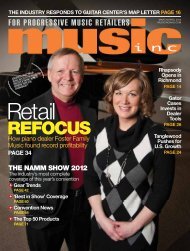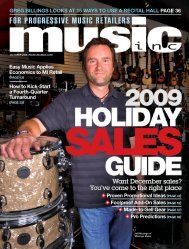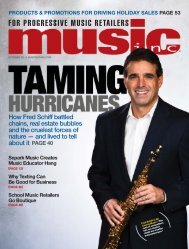BOUTIQUE - Music Inc. Magazine
BOUTIQUE - Music Inc. Magazine
BOUTIQUE - Music Inc. Magazine
Create successful ePaper yourself
Turn your PDF publications into a flip-book with our unique Google optimized e-Paper software.
50 I MUSIC INC. I JANUARY 2011<br />
lESSonS lEarnED i By GErSon roSEnBlooM<br />
Surviving the Downturn<br />
What I’m about to share has become painfully clear as I call on<br />
retailers all over the country. I see an alarming number of you<br />
making mistakes similar to those that contributed to the demise<br />
of my dealership. The precipitating factor is usually a fall-off of<br />
business caused by a weakened economy. But the economy is<br />
just a reality. What you do with this new reality — how you decide to cope with<br />
it — largely dictates how you will fare as we come through this period.<br />
There are countless strategies — some better than<br />
others. Cutting needless costs works. Marketing smarter<br />
is a good one. Watching your inventory is more important<br />
than ever. But contained in this last item is a perilous<br />
temptation that’s almost sure to take a downward trend<br />
and turn it into an out-of-control spiral.<br />
When the financial pressures of declining business<br />
grew, I fell into the trap of stopping almost all purchasing.<br />
The dreaded buying freeze usually starts with this<br />
line of thinking: “We don’t have enough money to buy<br />
inventory, so we’ll sell what we’ve got.” Selling what<br />
you’ve got always makes sense. Not replacing it is a<br />
formula for trouble. Replacing it with the same stuff<br />
that got you into trouble is insanity.<br />
The decision to stop all but essential purchases is<br />
natural enough under dire circumstances. But in reality,<br />
it’s a knee-jerk reaction that has the potential to<br />
become a self-fulfilling prophecy. If your mindset<br />
is to do only what it takes to pay your bills this<br />
month, as if there’s no tomorrow, you may just<br />
Three steps for<br />
managing inventory when<br />
business slows down<br />
find that you “fish your wish” — and there will<br />
be no tomorrow.<br />
Job No. 1 is to pay your current bills. But<br />
doing so cannot become your sole focus. While<br />
creating a strategy for meeting current expenses,<br />
you need to determine how to overcome what<br />
created the problems in the first place. The economy<br />
accentuates weaknesses in your business,<br />
but eliminating those weaknesses helps you to<br />
transcend the challenges over which you have no control.<br />
If I could do it over again, I would follow this three-step process with inventory<br />
in order to create a fresh, exciting atmosphere where local clientele would<br />
flock to see the next great thing.<br />
First, I’d evaluate every department, every product category, every<br />
brand and every product within those brands. Nothing would be sacred.<br />
I’d get rid of any lines or products<br />
within a line that weren’t tangibly<br />
contributing to my success. If an<br />
entire department in my organization<br />
wasn’t carrying its weight, it<br />
would get the chopping block. I’d<br />
purge myself of the notion that<br />
some products need to be around<br />
to draw traffic. I had those lines,<br />
and I had no traffic. Duh!<br />
Second, having identified the<br />
dead weight, I’d do whatever it<br />
took to turn the chaff into cash.<br />
Forget costs, forget preconceived<br />
notions of market value. Everything<br />
has a price, and you need<br />
to find it quickly. Use eBay, if not<br />
to sell your stuff then to find out<br />
what it’s worth in the real world.<br />
If product isn’t contributing to the<br />
ongoing success of your business,<br />
at least let it generate ready cash.<br />
Finally, I’d commit to resolving<br />
the inventory issues<br />
that had turned my business<br />
stagnant. Carrying the tried-andtrue<br />
lines was turning my business<br />
black and blue. So, I’d shake<br />
things up and bring in fresh, new,<br />
exciting lines, while continuing<br />
to work with those original lines<br />
that were still contributing to my<br />
bottom line in a meaningful way.<br />
Combining this approach to inventory<br />
management with sound<br />
marketing and financial management<br />
is a formula for surviving<br />
the economic downturn. MI<br />
Gerson Rosenbloom is managing director of<br />
Wechter Guitars. He’s former president of<br />
Medley <strong>Music</strong> and a past NAMM chairman.<br />
E-mail him at gersonmusicinc@gmail.com.
















